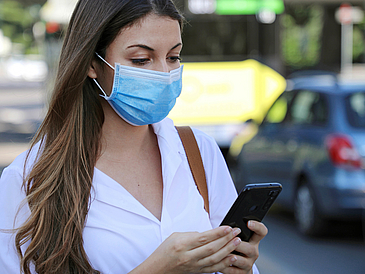It is with an initiative to wash your hands, keep your distance, and donate your data, that the Robert Koch Institute addressed the German public in April 2020. The general public can contribute to the earlier recognition of the spread of corona and thus the more precise fight against the virus by using the free corona app. The stated measures to protect against infection are to be carried using a “fever map” of Germany, which is to be created by RKI and will be a geographically-based image of where fever-related illness prevails. This is to enable the drawing of indirect conclusions regarding acute COVID-19 hot spots.
In August, over half a million people downloaded the app. Alongside the zip code, the “data donation” app passes on various vitals (pulse, heart rate variability, stress, temperature, weight, blood pressure) and sociodemographic data (age, height, gender, weight). However, not all data is necessarily recorded – this is dependent on the device and willingness of the donors.
Whilst the Robert Koch Institute analyzes the data, little is known about the motivation, (bodily) experience, and significance of the data donors: Which thoughts and feelings do people connect to the donation of bodily data in the frame of the RKI data donation app? Which expectations do they have with regard to their commitment? How does their own awareness of their body and of the crisis change? Which hopes and emotions are linked with the donation? This is to be researched in the frame of qualitative interviews. Said interviews are to be carried out until the end of August. They will be carried out online via Zoom or on the phone – at no point will personal contact to the researchers be required.
Conditions of Participation:
The conditions for participation in the study are: You must be over 18 and be able to use the RKI app, which receives your bodily data via wearables, smartwatches, etc. and which analyzes said data for the purpose of protection against infection during the corona pandemic. Sufficient knowledge of German or English is also necessary.
About the IPP
The Institute of Public Health and Nursing Research (IPP) at the University of Bremen is one of the largest research institutions in this field in Germany. A central research and teaching objective is the promotion of health and well-being at population level. The IPP was established in 2005 as a scientific institution within the Faculty of Human and Health Sciences. There are more than 60 scientists who now carry out research and teach in nine departments and working groups. The strengths of the IPP are the interdisciplinary public health and nursing research, research-oriented teaching in health and nursing science degrees, and knowledge transfer to practical fields, politics, and society.
About Leibniz ScienceCampus Digital Public Health Bremen
Scientists from the fields of health sciences, computer science, statistics, law, communication sciences, ethnology, and philosophy work together within the LWC DiPH. Early career academics are expediently supported in the Early Career Researcher Academy. Together, they address interdisciplinary issues of digital technology development and assessment in public health. The University of Bremen, the Fraunhofer Institute for Digital Medicine MEVIS, and the Leibniz Institute for Prevention Research and Epidemiology – BIPS are involved.
Further Information:
https://www.public-health.uni-bremen.de/staff/monika-urban/projects/en/
https://www.ipp.uni-bremen.de/home/en/
http://www.healthsciences.uni-bremen.de/en/
https://www.lsc-digital-public-health.de/en/
Contact:
Dr. Monika Urban
Institute of Public Health and Nursing Research (IPP)
Phone: +49 (0)421 218-68876
Email: murbanprotect me ?!uni-bremenprotect me ?!.de

